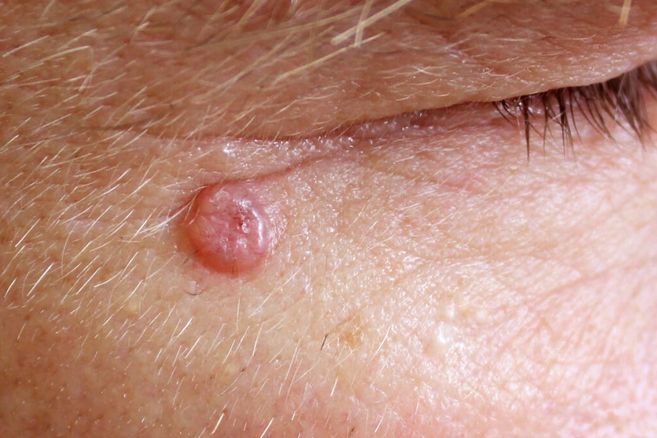Skin Cancer: Understanding Types, Symptoms, and Treatment
Skin cancer is one of the most common types of cancer in the UK, but early detection makes a big difference.
Learn how to recognise the signs, understand your treatment options, and protect your skin.
Dr James Wilson offers expert, patient-centred care for all types of skin cancer—book your consultation today.


Jump to:
- Introduction to Skin Cancer
- What is Skin Cancer?
- Causes of Skin Cancer
- Primary Cause: Ultraviolet (UV) Radiation
- Other Contributing Factors
- Types of Skin Cancer
- Melanoma
- Non-Melanoma Skin Cancer
- Basal Cell Carcinoma (BCC)
- Squamous Cell Carcinoma (SCC)
- Rare Types of Skin Cancer
- Skin Cancer Symptoms
- Symptoms of Melanoma
- Symptoms of Non-Melanoma Skin Cancer
- Risk Factors for Skin Cancer
- Skin Type and Colour
- Family History and Genetics
- History of Sunburns
- Having Many Moles
- Weakened Immune System
- Other Risk Factors
- Preventing Skin Cancer
- Sun Protection Measures
- Regular Skin Self-Exams
- Avoiding Tanning Beds (Sunbeds)
- Diagnosing Skin Cancer
- Methods of Diagnosis
- Importance of Early Detection
- Treatment Options for Skin Cancer
- Treatments for Melanoma
- Treatments for Non-Melanoma Skin Cancer
- Surgical Treatments
- Non-Surgical Treatments
- Living with Skin Cancer
- Coping Strategies
- Support Resources
- How Our Clinic Can Help
- Expert Diagnosis and Treatment
- Patient-Centred Care
- Why Choose Us?
- Book Your Consultation Today
- Conclusion
- Key Takeaways on Skin Cancer
- Emphasis on Proactive Skin Health
- References and Further Reading
Introduction to Skin Cancer
Skin cancer is one of the most common types of cancer in the UK. It occurs when abnormal skin cells grow uncontrollably, often due to exposure to ultraviolet light. Early detection is key to effective skin cancer treatment.
This guide will help you understand the different types of skin cancer, how to spot the signs, and what to expect from treatment. If you notice any changes to your skin or have concerns, consider booking a consultation with Dr James Wilson.
What is Skin Cancer?
Skin cancer develops when normal cells in the skin mutate and grow into cancer cells. This growth of abnormal cells (tumours) can affect any area of skin but are especially common on sun-exposed areas such as the face, neck, and arms.
There are two main types of skin cancer: melanoma skin cancer and non-melanoma skin cancer. Each type affects the skin cells differently and requires a tailored approach to treatment.
Causes of Skin Cancer
Primary Cause: Ultraviolet (UV) Radiation
Of all the skin cancer risk factors, the leading cause of skin cancer is ultraviolet light from the sun or tanning beds (sunbeds). UV radiation damages the DNA in skin cells, which can lead to cancer over time.
Other Contributing Factors
-
Repeated sunburns, especially in childhood
-
A family history of skin cancer
-
Weakened immune system due to illness or organ transplant
-
Certain skin conditions such as Actinic Keratosis
-
Having many moles or an Abnormal Mole (Dysplastic nevus)
Types of Skin Cancer
Melanoma
Melanoma is the most serious type of skin cancer. It begins in the melanocytes, the cells that produce pigment. Malignant melanoma can spread quickly to other parts of the body if not caught early.
Non-Melanoma Skin Cancer
Non-melanoma skin cancer includes basal cell carcinoma and squamous cell carcinoma. These cancers are the most common skin cancers, but usually, BCCs are less aggressive than melanoma.
Basal Cell Carcinoma (BCC)
Basal cell carcinoma is the most common type of skin cancer. It affects the basal cells in the top layer of skin and often appears as a shiny bump or red patch.
Squamous Cell Carcinoma (SCC)
Squamous cell carcinoma, another of the most common skin cancers, affects the flat cells near the surface of the skin. It may look like a scaly patch or sore that doesn’t heal. Squamous cell skin cancers are more likely to spread than BCC.
Rare Types of Skin Cancer
-
Merkel Cell Carcinoma: A fast-growing cancer that forms in sun-exposed areas.
-
Dermatofibrosarcoma Protuberans: A slow-growing tumour that starts in the middle layer of skin.
-
Kaposi Sarcoma: A rare cancer linked to HIV infection (though not always) that affects blood vessels in the skin.
Skin Cancer Symptoms
Symptoms of Melanoma
-
A new dark spot or mole
-
Changes in an existing mole (size, shape, colour, symptoms such as itching or bleeding)
-
An abnormal mole with uneven borders
Symptoms of Non-Melanoma Skin Cancer
-
A sore that doesn’t heal
-
A shiny, pale, or waxy bump (common in basal cell skin cancer)
-
A scaly, red patch (often seen in squamous cell skin cancers)
Use mirrors to check your entire body, including hard-to-see areas. Early detection of skin cancer symptoms can make a significant difference. Remember that skin cancers can occur anywhere on the body, including the palms of the hands, soles of the feet or even between your toes.
When you have a mole checked, your doctor will also check nearby lymph nodes. In some patients, we recommends scans such as a CT scan or PET scan to stage the skin cancer.
Risk Factors for Skin Cancer
Skin Type and Colour
People with fair skin or light skin tones have a higher risk of skin cancer, but it can also occur in those with darker skin tones.
Family History and Genetics
A family history of skin cancer increases your risk, especially if combined with other risk factors.
History of Sunburns
Severe sunburns, especially in youth, can increase the risk of developing cancer later in life.
Having Many Moles
Numerous or unusual moles raise the chances of melanoma.
Weakened Immune System
Patients with a weakened immune system, such as after an organ transplant or due to HIV infection, have an increased risk of skin cancer.
Other Risk Factors
-
Older people are more likely to develop skin cancer
-
Exposure to certain chemicals
-
Male gender (linked to higher outdoor exposure)
Preventing Skin Cancer
Sun Protection Measures
-
Wear sunscreen daily with broad-spectrum protection (SPF 30 or higher) - make it a standard part of your skin care routine
-
Avoid sun exposure during peak hours (11am–3pm)
-
Wear protective clothing and wide-brimmed hats
Regular Skin Self-Exams
Check all areas of the body monthly. Look for changes in moles, new growths, or persistent sores.
Avoiding Tanning Beds (Sunbeds)
Tanning beds emit UV radiation and significantly increase the risk of skin cancer.
Diagnosing Skin Cancer
Methods of Diagnosis
-
Skin examination by a healthcare provider (dermatologist)
-
Dermoscopy (using a magnifying tool)
-
Biopsy of the affected area of skin
Importance of Early Detection
Spotting cancer in the early stages often means simpler, more effective treatments. If you're concerned about any area of skin, seek a prompt evaluation.
Treatment Options for Skin Cancer
Treatments for Melanoma
-
Surgical excision
-
Immunotherapy
-
Targeted drug therapy
-
Radiation therapy (in some cases)
See the articles section of this site for more information about malignant melanoma. The recommended treatment will depend upon the stage of the melanoma and your general health.
Treatments for Non-Melanoma Skin Cancer
-
Surgical Treatments: Excision, curettage, and Mohs surgery
-
Non-Surgical Treatments: Radiotherapy, photodynamic therapy, topical creams (eg. efudix), and cryotherapy. These local treatments are not usually associated with hair loss unless the area being treated is in hear-bearing skin.
Surgical Treatments
Mohs surgery is a precise method often used for basal cell cancer or squamous cell carcinoma in sensitive areas.
Non-Surgical Treatments
Photodynamic therapy uses light-activated drugs to destroy cancer cells. It's effective for early stages and some cases of Actinic Keratosis.
Radiotherapy is a highly effective treatment for non-melanoma skin cancer. Read more about that here.
Living with Skin Cancer
Coping Strategies
-
Stay informed about your condition
-
Maintain open communication with your healthcare provider
-
Join support groups to share experiences
Support Resources
-
NHS website
-
Skin Cancer Foundation
-
Cancer Information from trusted sources such as the Cleveland Clinic and Mayo Clinic
How Our Clinic Can Help
Expert Diagnosis and Treatment
Dr James Wilson is a leading clinical oncologist with a reputation for providing expert care. Patients describe him as professional, compassionate, and incredibly thorough.
Patient-Centred Care
Dr Wilson treats every patient as an individual. His warm, straightforward manner makes even the most difficult conversations feel manageable.
Why Choose Us?
-
Personalised care with proven results
-
Access to the latest treatment options and clinical trials
-
Unwavering commitment to patient wellbeing
-
Always collect feedback and welcome your comments
Book Your Consultation Today
If you’re concerned about a mole or spot, or want expert advice on protecting your skin, don’t wait. Book a consultation with Dr Wilson and take the first step toward peace of mind.
Conclusion
Key Takeaways on Skin Cancer
-
Skin cancer is common but treatable, especially when caught early
-
There are several main types of skin cancer, including melanoma and non-melanoma
-
UV radiation is the leading cause, but other risk factors also play a role
Emphasis on Proactive Skin Health
Protect your skin, know your risk factors, and check regularly. Your skin health is worth protecting.
For trusted care, personalised support, and expert treatment, Dr James Wilson is here to help.
References and Further Reading
-
NHS Skin Cancer Overview
-
Cleveland Clinic – Skin Cancer Guide
Book a consultation with Dr. Wilson today to get your skin checked or discuss any concerns about skin cancer. Click here to schedule your appointment.